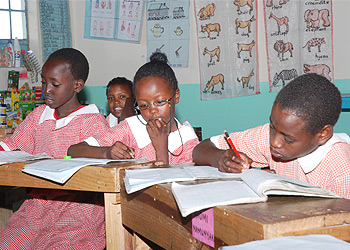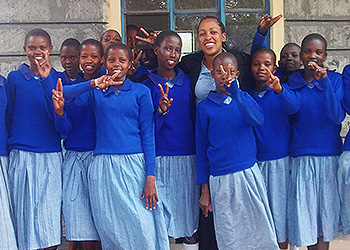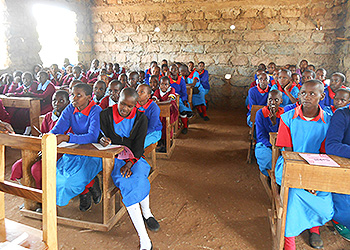
Overview
MGEF is committed to increasing enrollment of Maasai girls in Kenya and helping each student achieve economic independence by offering scholarships from primary school through secondary school, vocational school, or college. We have designed our scholarship program to provide broad benefits throughout Kenya’s Kajiado County where we work and to maximize the success of our students. Our scholarships are all-inclusive and include room, board, tuition, uniforms and supplies.
The scholarship application process is thorough and democratic.
MGEF works to get girls in school and to keep them there until they have the knowledge and skills to enter the workforce in Kenya. Once a primary school student receives a scholarship, she is enrolled in the qualified boarding school closest to her parents’ home to facilitate parental involvement in her education, unless she is at high risk of being married off. High-risk students board at schools with rescue centers, where they can stay during school breaks. Boarding schools must perform in the top one-third in their Districts. Secondary students must receive an invitation from a school before being admitted. MGEF staff in Kajiado works to get an invitation from the best school possible. After secondary school, MGEF works with every student to select the best post-secondary option, and to ensure that their choice of study has a viable job market in Kenya.
How the Scholarship Program Works
MGEF’s Scholarship Program focuses on increasing enrollment of Maasai girls, doing everything possible to ensure that they succeed in school, and giving every student the opportunity for economic independence.

Getting girls in school
MGEF works with the staff in Kajiado, Kenya, and 56 volunteers to identify girls who are not enrolled in school or who are at risk of dropping out of school because of early marriage. The volunteers represent multiple locations throughout the Kajiado County so that benefits are broadly offered. The circumstance of each girl is verified at three levels: the local level, the division level, and the institutional level. Volunteers submit applications after visiting the applicant’s family home (manyatta) to verify that a scholarship is justified. The application is submitted to a Kajiado Board member, who also verifies the circumstances described in the application. When funding becomes available, the Kajiado Board of Directors meets to review applications and offer scholarships to those who are most in need. Occasionally, fast action is required for urgent needs, such as a suddenly announced wedding, or change in economic circumstances.

Keeping girls in school
MGEF is committed to each student’s success. Girls are enrolled in boarding schools, where they will receive better nutrition, structured study time, and health care, and they will also be away from family and peer pressure to marry when they reach puberty. Report cards are collected after each term: Kenya schools operate on a trimester system with school breaks in April, August, and December. Any drop in grades is immediately investigated. An MGEF volunteer visits the school and even the family to identify any problems and help to resolve them.
Older students from the same home area or the same school are encouraged to assist younger students in the academic work, and with their emotional problems. When a Maasai girl reaches puberty, she is often conflicted about education. Most of her peers are getting married and starting their families. That is the way it has always been. Staying in school is the exception, and she is chided by her peers and pressured by her parents to drop out of school and marry, now that she is a woman. They need much encouragement, and MGEF staff, volunteers, and students are there to help them through this difficult stage. They are not dropped when their grades drop. In every case so far, they get through this period and go on to excel in their post-secondary education.
Providing role models
Every year, we host two workshops for our students. The first is a reception that brings together students, parents, role models and special speakers. We also hold an annual 3-day mentoring workshop for our students. The agenda includes discussion of the social barriers to academic success, including pressure for marriage, self-esteem, standing up for oneself, pressures for sex, which are most intense during secondary school years, and setting goals for the future. The workshop also creates a system for MGEF alumni and college students to act as mentors to secondary students during the most vulnerable years.
Fostering economic independence
MGEF staff meets with every secondary school graduate to help them select a school and field of study with a viable job market in Kenya. Our work is not complete until each student has the knowledge and skills to enter the workforce.
How to Sponsor a Girl
 Sponsorship is a long-term commitment to the complete education of a student through vocational school, college, or university. Sponsors receive a photo of their student every year, and can exchange letters with her. All sponsored students receive stationery to write to their sponsors. And if a visit to Kenya is in your travel plan, you will be able to meet her and visit her school as well.
Sponsorship is a long-term commitment to the complete education of a student through vocational school, college, or university. Sponsors receive a photo of their student every year, and can exchange letters with her. All sponsored students receive stationery to write to their sponsors. And if a visit to Kenya is in your travel plan, you will be able to meet her and visit her school as well.
The total annual cost to sponsor a student is:
Primary- $1,200
Secondary- $1,200
Postsecondary- $2,500
This cost is all-inclusive, as MGEF provides all that a student needs to succeed in school. Secondary school graduates have three possible options, depending on their performance on national tests at the end of their fourth year: certificate, diploma, and degree. All programs will prepare them for the workforce in Kenya.
If you are interested in making this commitment go to the how you can help section or sponsor a girl page.
General Scholarship Fund
 Not everyone is able to make a long-term commitment to sponsor a student, so we have established a General Scholarship Fund to offer scholarships to girls without having to find a sponsor first. This gives MGEF the ability to respond quickly to emergency situations, and has saved many girls from forced marriages, or from having to drop out of school because of poverty. The General Scholarship Fund is a pool of donations designated for education costs, but not for a specific student, and supports over half of our students from primary school through university.
Not everyone is able to make a long-term commitment to sponsor a student, so we have established a General Scholarship Fund to offer scholarships to girls without having to find a sponsor first. This gives MGEF the ability to respond quickly to emergency situations, and has saved many girls from forced marriages, or from having to drop out of school because of poverty. The General Scholarship Fund is a pool of donations designated for education costs, but not for a specific student, and supports over half of our students from primary school through university.
Please consider making a donation to the General Scholarship Fund.
Scholarship Costs

Scholarship costs vary from school to school and with the changes in the Kenya Shilling exchange rate.
For sponsorship options and costs:
